
THE FOUR CARDINAL VIRTUES The Four Cardinal Virtues PRUDENCE JUSTICE FORTITUDE TEMPERANCE JOSEF PIEPER Edition with Notes UNIVERSITY OF NOTRE DAME PRESS First paperback edition 1966 by University of Notre Dame Press, Notre Dame, Indiana Published by arrangement with Harcourt, Brace & World, Inc. Copyright 1954, 1955, 1959 by Pantheon Books Inc. Copyright 1965 by Harcourt, Brace & World, Inc. All rights reserved. Library of Congress Catalog Card Number: 65-14713 The studies united here in one volume were published separately in this sequence: Fortitude and Temperance 1954 Justice 1955 Prudence 1959 First published in Germany under the titles, Vom Sinn der Tapferkeit, Zucht und Mass, Ober die Gerechtigkeit, Traktat ber die Klugheit, by Kosel-Verlag. The present edition was edited by the author and slightly cut to avoid repetitions; notes and source references have been deleted. All quotations in the text are taken from works of Thomas Aquinas, unless the author is otherwise identified. Prudence is a translation of Traktat ber die Klugheit, and was translated by Richard and Clara Winston.
Justice is a translation of ber die Gerechtigkeit, and was translated by Lawrence E. Lynch.
Fortitude is a translation of Vom Sinn der Tapferkeit, and was translated by Daniel F. Coogan.
Temperance is a translation of Zucbt und Mass, and was translated by Daniel F. Coogan.
To the memory of my son THOMAS PIEPER
who, as a young scientist, went to the United States in September 1963,
and suddenly died there on July 24, 1964. Contents Preface WHEN AGATHON in Plato's Symposium takes his turn at making a speech in praise of Love, he organizes his ideas around the four cardinal virtues: prudence, justice, fortitude, and temperance. An avant-garde intellectual who, incidentally, is the host at that famous banquet, Agathon offers no special reasons for this approach. That is, the contemporaries of Socrates already took for granted these traditional categories sprung from the earliest speculative thinking. They took for granted not only the idea of virtue, which signifies human rightness, but also the attempt to define it in that fourfold spectrum. This particular intellectual framework, the formula which is called the "doctrine of virtue," was one of the great discoveries in the history of man's self-understanding, and it has continued to be part and parcel of the European mind. It has become a basic component of the European consciousness, as the result of centuries of persistent intellectual endeavor by all the creative elements of the emerging West, both the Greeks (Plato, Aristotle) and the Romans (Cicero, Seneca), both Judaism (Philo) and Christianity (Clement of Alexandria, St. Augustine). It is true that the classic origins of the doctrine of virtue later made Christian critics suspicious of it. They warily regarded it as too philosophical and not Scriptural enough. Thus, they preferred to talk about commandments and duties rather than about virtues. To define the obligations of man is certainly a legitimate, even estimable, and no doubt necessary undertaking. With a doctrine of commandments or duties, however, there is always the danger of arbitrarily drawing up a list of requirements and losing sight of the human person who "ought" to do this or that. The doctrine of virtue, on the other hand, has things to say about this human person; it speaks both of the kind of being which is his when he enters the world, as a consequence of his createdness, and the kind of being he ought to strive toward and attain to by being prudent, just, brave, and temperate. The doctrine of virtue, that is, is one form of the doctrine of obligation; but one by nature free of regimentation and restriction. On the contrary, its aim is to clear a trail, to open a way. But this is not the place to launch a disputation on the various possible modes of ethical statement. Rather, what I wish to do is to describe just one of those modes, and to reveal, as far as possible, its full reach: that team of four, the basic virtues, which, as a fine classical phrase put it, can enable man to attain the furthest potentialities of his nature. In this realm, originality of thought and diction is of small importance should, in fact, be distrusted. It can hardly be expected that there will be entirely new insights on such a subject. We may well turn to the "wisdom of the ancients" in our human quest to understand reality, for that wisdom contains a truly inexhaustible contemporaneity. The intention of this book is to reveal some of that contemporaneity. Some readers may wonder why, in my effort to revive a classical heritage, I so often cite a certain medieval writer, Thomas Aquinas. I do so not from a more or less accidental historical interest, but because I believe that the testimony of the "universal teacher" of a still undivided Western Christianity has a special value. This lies not so much in his personal genius as in the truly creative selflessness with which he expressed the vast, contrapuntal range of possible statements about the cosmos even as he recognized and called upon his readers to go beyond the limitations of his own vision. Marked though this thought is by an altogether extraordinary grasp and the most disciplined, dynamic, and penetrating independent thinking, there yet speaks through it less the individual writer, Thomas Aquinas, than the voice of the great tradition of human wisdom itself. The interpreter, in these latter days, invokes this tradition in the hope of seeming less ridiculous as he boldly drafts a moral standard for humanity which he, in his own daily life, is utterly unable to meet. PRUDENCE If thy eye is single, the whole of thy body will be lit up. MATTHEW 6, 22 1. The First of the Cardinal Virtues NO DICTUM in traditional Christian doctrine strikes such a note of strangeness to the ears of contemporaries, even contemporary Christians, as this one: that the virtue of prudence is the mold and "mother" of all the other cardinal virtues, of justice, fortitude, and temperance. In other words, none but the prudent man can be just, brave, and temperate, and the good man is good in so far as he is prudent. Our uneasiness and alienation would be only the greater if we were to take the proposition as seriously as it is meant. But we have grown accustomed to disregarding such hierarchic rankings among spiritual and ethical qualities. This is especially true for the "virtues." We assume that they are allegories, and that there is really no need to asisgn them an order of rank. We tend to think that it does not matter at all which of the four cardinal virtues may have drawn first prize in the lottery arranged by "scholastic" theologians. Yet the fact is that nothing less than the whole ordered structure of the Occidental Christian view of man rests upon the pre-eminence of prudence over the other virtues. The structural framework of Occidental Christian metaphysics as a whole stands revealed, perhaps more plainly than in any other single ethical dictum, in the proposition that prudence is the foremost of the virtues. That structure is built thus: that Being precedes Truth, and that Truth precedes the Good. Indeed, the living fire at the heart of the dictum is the central mystery of Christian theology: that the Father begets the Eternal Word, and that the Holy Spirit proceeds out of the Father and the Word. Since this is so, there is a larger significance in the fact that people today can respond to this assertion of the pre-eminence of prudence only with incomprehension and uneasiness. That they feel it as strange may well reveal a deeper-seated and more total estrangement. It may mean that they no longer feel the binding force of the Christian Occidental view of man. It may denote the beginning of an incomprehension of the fundamentals of Christian teaching in regard to the nature of reality.
 Next page
Next page

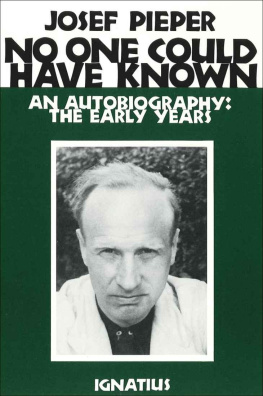
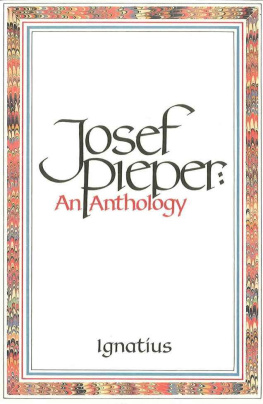
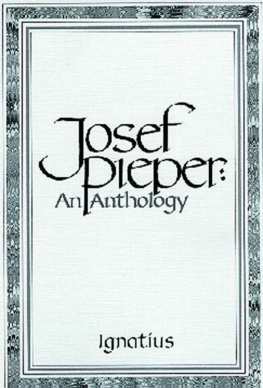
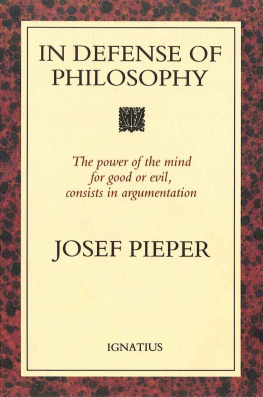
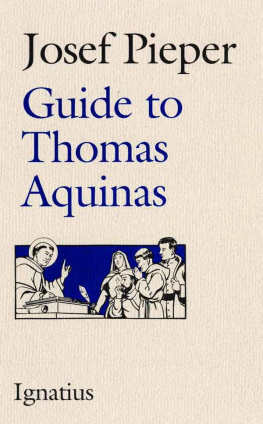


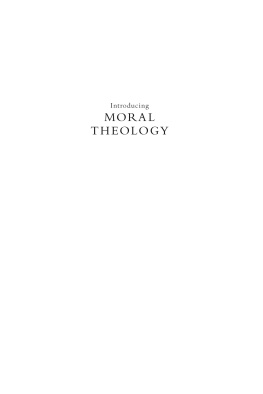
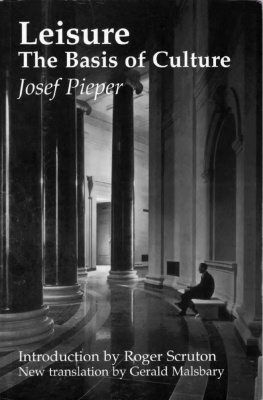
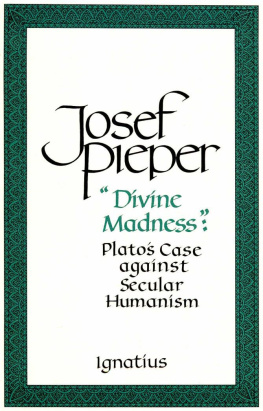

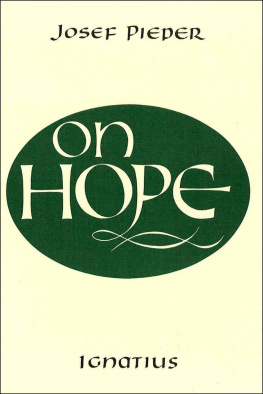
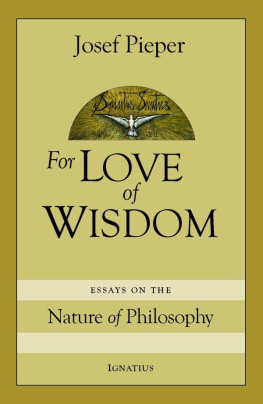
 THE FOUR CARDINAL VIRTUES The Four Cardinal Virtues PRUDENCE JUSTICE FORTITUDE TEMPERANCE JOSEF PIEPER Edition with Notes UNIVERSITY OF NOTRE DAME PRESS First paperback edition 1966 by University of Notre Dame Press, Notre Dame, Indiana Published by arrangement with Harcourt, Brace & World, Inc. Copyright 1954, 1955, 1959 by Pantheon Books Inc. Copyright 1965 by Harcourt, Brace & World, Inc. All rights reserved. Library of Congress Catalog Card Number: 65-14713 The studies united here in one volume were published separately in this sequence: Fortitude and Temperance 1954 Justice 1955 Prudence 1959 First published in Germany under the titles, Vom Sinn der Tapferkeit, Zucht und Mass, Ober die Gerechtigkeit, Traktat ber die Klugheit, by Kosel-Verlag. The present edition was edited by the author and slightly cut to avoid repetitions; notes and source references have been deleted. All quotations in the text are taken from works of Thomas Aquinas, unless the author is otherwise identified. Prudence is a translation of Traktat ber die Klugheit, and was translated by Richard and Clara Winston.
THE FOUR CARDINAL VIRTUES The Four Cardinal Virtues PRUDENCE JUSTICE FORTITUDE TEMPERANCE JOSEF PIEPER Edition with Notes UNIVERSITY OF NOTRE DAME PRESS First paperback edition 1966 by University of Notre Dame Press, Notre Dame, Indiana Published by arrangement with Harcourt, Brace & World, Inc. Copyright 1954, 1955, 1959 by Pantheon Books Inc. Copyright 1965 by Harcourt, Brace & World, Inc. All rights reserved. Library of Congress Catalog Card Number: 65-14713 The studies united here in one volume were published separately in this sequence: Fortitude and Temperance 1954 Justice 1955 Prudence 1959 First published in Germany under the titles, Vom Sinn der Tapferkeit, Zucht und Mass, Ober die Gerechtigkeit, Traktat ber die Klugheit, by Kosel-Verlag. The present edition was edited by the author and slightly cut to avoid repetitions; notes and source references have been deleted. All quotations in the text are taken from works of Thomas Aquinas, unless the author is otherwise identified. Prudence is a translation of Traktat ber die Klugheit, and was translated by Richard and Clara Winston. 